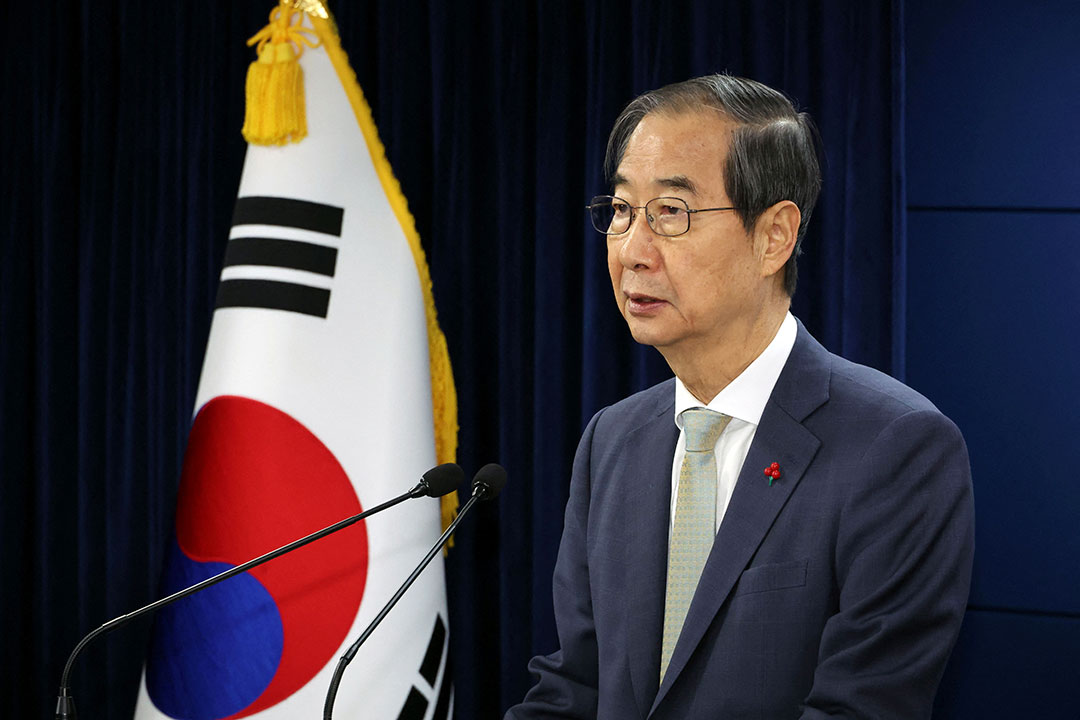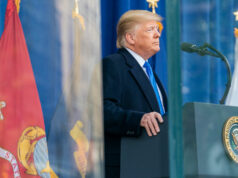Korea’s acting president moves to reassure allies

SEOUL — South Korea’s acting president, Han Duck-soo, moved on Sunday to reassure the country’s allies and calm financial markets a day after President Yoon Suk Yeol was impeached and suspended from his duties over a martial law attempt.
Han spoke with US President Joseph R. Biden by phone, the White House and Mr. Han’s office said.
“South Korea will carry out its foreign and security policies without disruption and strive to ensure the South Korea-US alliance is maintained and developed steadfastly,” Mr. Han said, according to a statement from his office.
In a further attempt to stabilize the country’s leadership, the main opposition party announced it would not seek to impeach Mr. Han for his involvement in Mr. Yoon’s Dec. 3 martial law decision.
“Given that the prime minister has already been confirmed as acting president and considering that excessive impeachments could lead to confusion in national governance, we have decided not to proceed with impeachment procedures,” Democratic Party leader Lee Jae-myung told reporters.
Mr. Han, a longtime technocrat picked by Yoon as prime minister, was elevated to acting president in accordance with the constitution while Mr. Yoon’s case moves to the Constitutional Court.
NORTH KOREAN THREAT
Mr. Yoon’s surprise martial law declaration and the ensuing political crisis spooked markets and South Korea’s diplomatic partners worried over the country’s ability to deter nuclear-armed North Korea.
Biden told Han the ironclad U.S.-South Korea alliance remained unchanged and Washington would work with Seoul to further develop and strengthen the alliance as well as trilateral cooperation including neighbor Japan, Han’s office said.
The White House said in a statement that the US president “expressed his appreciation for the resiliency of democracy and the rule of law in the ROK and reaffirmed the ironclad commitment of the United States to the people of the ROK,” using the abbreviation for the country’s formal name, the Republic of Korea.
“President Biden expressed his confidence that the Alliance will remain the linchpin for peace and prosperity in the Indo-Pacific region during Acting President Han’s tenure.”
Han convened his cabinet and National Security Council shortly after Saturday’s impeachment vote and vowed to maintain military readiness to prevent any breach of national security.
South Korea’s partners wanted to see a credible and constitutional temporary leadership put in place as soon as possible, said Philip Turner, a former New Zealand ambassador to South Korea.
“They will be pleased to see Prime Minister Han take over as acting president,” he said. “He is capable, experienced and well respected in foreign capitals.”
But even with an acting president in place, international partners face months of uncertainty before a new president can be elected and a new government established, Mr. Turner added.
The Constitutional Court has up to six months to decide whether to remove or reinstate Mr. Yoon. If he is removed or resigns, a new elections will be held within 60 days.
“During that time Korea’s highly competent professional bureaucracy can be relied on to keep the country’s foreign policy running, but they will find it hard to provide clear direction,” Mr. Turner said.
ECONOMIC FALLOUT
South Korean shares rose for a fourth straight session on Friday on hopes that the political uncertainty would ease after the impeachment vote in parliament, which followed a failed vote a week earlier.
Democratic Party leader Mr. Lee said the most pressing issue is a slump in consumption caused by insufficient domestic demand and the government’s reduction of its fiscal role.
He called for a National Stability Council for Governance comprising the government and parliament to discuss finance, economy and public livelihoods.
“To address this, I believe it is necessary to promptly discuss a supplementary budget,” Mr. Lee said, adding that a supplementary budget could include funding to support small businesses and investments related to artificial intelligence and infrastructure to try to head off energy shortages.
Parliament, controlled by Mr. Lee’s party, passed a 673.3 trillion won ($470.6 billion) 2025 budget bill on Tuesday that cut the government’s 677.4 trillion won proposal, without reaching agreement with Mr. Yoon’s People Power Party and the government.
By law parliament cannot increase government budgets, and at the time the Democratic Party said a supplementary budget could be needed to address spending for people’s livelihoods.
The party said its cuts were mostly in reserve funds for the government, interest costs and funds allocated to the presidential office, prosecutors and auditors for classified operations. The government accused parliament of delaying projects for small businesses with the cuts.
Deadlock over budget issues was one of the justifications Yoon cited for imposing martial law. — Reuters



